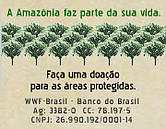Foto de Ricardo Funari / Lineair
The Plan
Over the next six months, Bertin will register and map all farms which directly supply cattle to the company. For the rest of the supply chain, including rearing and nursery farms, it will implement a traceability system from farms to its slaughterhouses and processing facilities by 2011. They will also ensure that they don’t buy cattle from indigenous and protected areas or from farms linked to slave labour, land conflicts and land grabbing.Bertin’s commitment to end Amazon deforestation comes soon after a similar announcement from Marfrig, one of the world's largest beef traders. It leaves Brazilian JBS-Friboi, the world’s largest producer and global exporter of processed beef as the last major exporter that has failed to commit to help end the destruction of the Amazon. Contrary to its competitors, JBS-Friboi is staying silent on the issue and is actually expanding into the Amazon, having rented several new facilities north of Mato Grosso State, an area which has the greatest rate of cattle ranching expansion and deforestation in the Amazon.
Brazil’s cattle sector needs to follow the soya industry’s example and commit to a moratorium. Both the federal and state governments have to ensure a moratorium is effective by mapping, registering and monitoring rural properties and helping the private sector fulfill its corporate responsibilities. Cattle ranching is the biggest driver of Amazon rainforest destruction and contributes to making Brazil the fourth largest climate polluter in the world.
Protecting forests and tackling climate change
There are just 114 days left till the UN Climate Summit in Copenhagen. We need Brazilian President Lula to support the industry initiatives and demonstrate that Brazil has measures in place to end Amazon destruction. We need all world leaders, at this year’s UN Climate Summit in Copenhagen, to agree on the funding required to end deforestation.We are calling for developed world governments to provide US 140 billion a year to tackle the climate crisis, to fund both mitigation and adaptation measures in developing countries. Approximately US 40 billion a year of this should be designated to forest protection. The funds would be provided in return for a commitment to stop deforestation globally by 2020.




































 Monitoramento da Floresta Amazônica Brasileira por Satélite - PRODES
Monitoramento da Floresta Amazônica Brasileira por Satélite - PRODES Sistema de Detecção de Desmatamento em Tempo Real - DETER
Sistema de Detecção de Desmatamento em Tempo Real - DETER


0 comentários:
Enviar um comentário